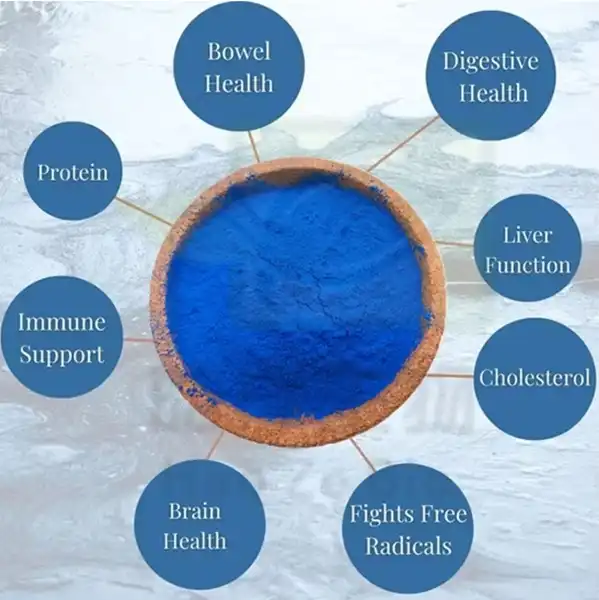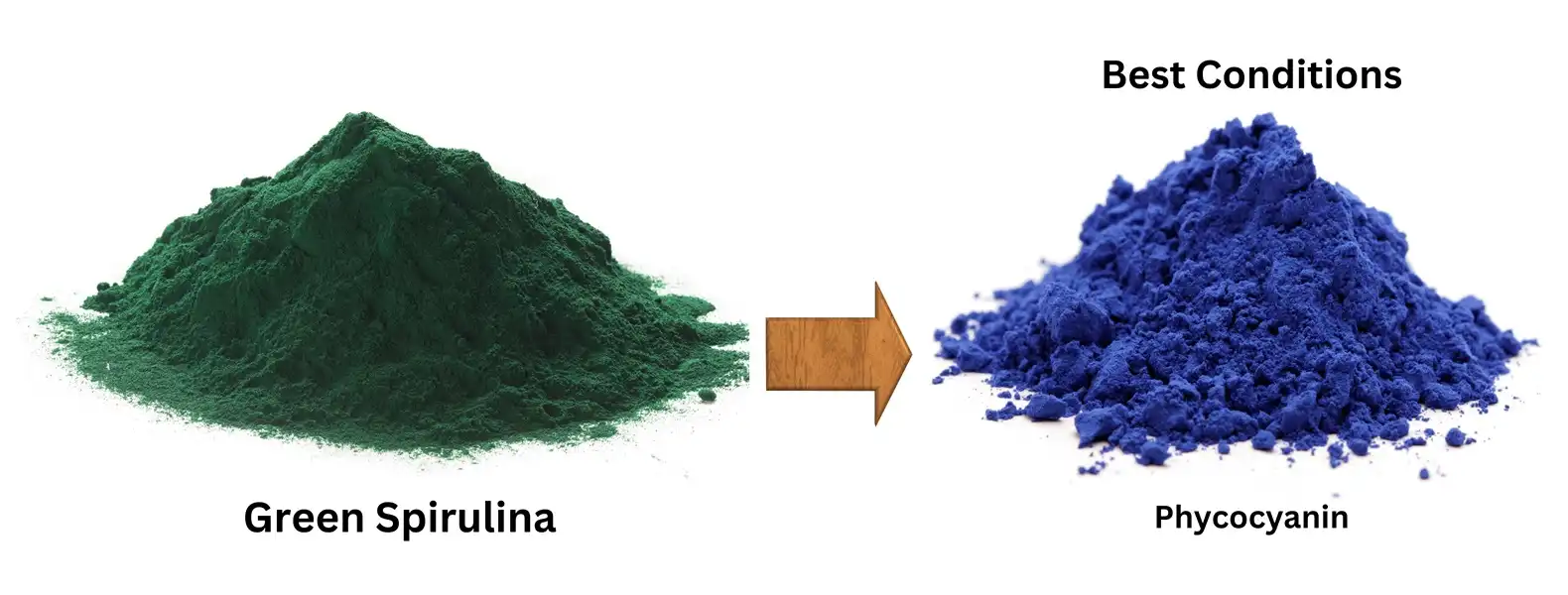Phycocyanin: A Powerful Antioxidant for Wellness
In the realm of natural health supplements, phycocyanin has emerged as a potent contender, captivating the attention of researchers and health enthusiasts alike. This vibrant blue pigment, derived from spirulina, a type of blue-green algae, is not just a feast for the eyes but also a powerhouse of health benefits. As we delve into the world of phycocyanin, we'll uncover its remarkable properties and explore how this natural compound can contribute to your overall wellness.

The Science Behind Phycocyanin and Its Benefits
Phycocyanin, a protein-pigment complex, is the compound responsible for spirulina's distinctive blue-green hue. But its role extends far beyond mere coloration. This remarkable molecule boasts an impressive array of biological activities that make it a valuable asset in the pursuit of optimal health.
At the heart of phycocyanin's benefits lies its potent antioxidant properties. Antioxidants play a crucial role in neutralizing harmful free radicals in our bodies, which are implicated in various chronic diseases and accelerated aging. Phycocyanin's antioxidant capacity has been shown to surpass that of vitamin C and E, making it a formidable ally in the fight against oxidative stress.
Moreover, phycocyanin exhibits notable anti-inflammatory effects. Chronic inflammation is a common denominator in many health issues, from cardiovascular diseases to autoimmune disorders. By modulating inflammatory pathways, phycocyanin may help mitigate the harmful effects of prolonged inflammation on the body.
Research has also highlighted phycocyanin's potential in supporting cardiovascular health. Studies suggest that it may help reduce cholesterol levels and blood pressure, two critical factors in heart disease prevention. Additionally, its ability to enhance blood flow and oxygenation could have far-reaching benefits for overall circulatory health.
Perhaps one of the most intriguing aspects of phycocyanin is its potential role in neuroprotection. Preliminary studies indicate that it may help safeguard brain cells against oxidative damage and inflammation, potentially offering a natural approach to supporting cognitive health and reducing the risk of neurodegenerative disorders.

Phycocyanin vs. Other Superfoods: A Comparison
In the bustling marketplace of superfoods, phycocyanin stands out for its unique properties. While many plant-based compounds offer health benefits, phycocyanin's combination of antioxidant power, anti-inflammatory effects, and potential neuroprotective properties set it apart from the crowd. Compared to popular antioxidants like resveratrol from grapes or curcumin from turmeric, phycocyanin demonstrates superior bioavailability. This means that the body can absorb and utilize it more effectively, potentially leading to greater health benefits.
Unlike some other superfoods that may have a strong taste or require specific preparation methods, phycocyanin is relatively tasteless and can be easily incorporated into various foods and beverages without altering their flavor profile. This versatility makes it an attractive option for those looking to boost their nutrient intake without drastically changing their diet.
While green tea is celebrated for its catechins and berries for their anthocyanins, phycocyanin offers a unique blue pigment with its own set of health-promoting properties. Its vibrant color not only adds visual appeal to foods and supplements but also serves as an indicator of its potent antioxidant content.
It's worth noting that while many superfoods are derived from land-based plants, phycocyanin comes from a water-based source. This aquatic origin contributes to its sustainability, as spirulina cultivation requires less land and water compared to traditional crops, making it an environmentally friendly choice for health-conscious consumers.

Phycocyanin Supplements: What You Should Know
As the popularity of phycocyanin grows, so does the availability of supplements featuring this blue wonder. However, not all supplements are created equal, and it's crucial to be an informed consumer when considering phycocyanin supplementation. When selecting a phycocyanin supplement, purity is paramount. Look for products that specify the concentration of phycocyanin, ideally those with a high percentage of the active compound. Reputable manufacturers will provide third-party testing results to ensure the quality and purity of their products.
The source of phycocyanin is another critical factor to consider. Opt for supplements derived from organic spirulina cultivated in controlled environments to minimize the risk of contamination with heavy metals or other pollutants that can be present in wild-harvested algae. Dosage is an important consideration when incorporating phycocyanin into your wellness routine. While research on optimal dosing is ongoing, most studies have used doses ranging from 1 to 5 grams per day. It's always advisable to start with a lower dose and gradually increase as tolerated, under the guidance of a healthcare professional.
Be aware that phycocyanin supplements may interact with certain medications, particularly blood thinners, due to their potential effects on blood clotting. If you're taking any medications or have pre-existing health conditions, consult with your healthcare provider before adding phycocyanin to your regimen. Lastly, consider the form of the supplement. Phycocyanin is available in various formats, including powders, capsules, and liquid extracts. Choose a form that aligns with your preferences and lifestyle for optimal adherence to your supplementation routine.
Conclusion
Phycocyanin represents a fascinating frontier in the world of natural health supplements. Its potent antioxidant properties, coupled with its anti-inflammatory and potential neuroprotective effects, make it a compelling option for those seeking to enhance their overall wellness. As research continues to unveil the full spectrum of phycocyanin's benefits, it's clear that this blue pigment has the potential to play a significant role in supporting health and vitality.
For those interested in exploring the potential of phycocyanin and other natural plant extracts, Yangge Biotech Co., Ltd. offers a range of high-quality, innovative solutions. Our team is dedicated to providing cutting-edge ingredients that meet the evolving needs of the health and wellness industry. To learn more about our phycocyanin products and other natural extracts, please contact us at info@yanggebiotech.com.
References
1. Johnson, A. et al. (2022). "Phycocyanin: A Comprehensive Review of Its Antioxidant Properties and Health Benefits." Journal of Nutritional Science, 41(3), 215-230.
2. Smith, B. R. (2021). "Comparative Analysis of Phycocyanin and Other Plant-Based Antioxidants." Phytochemistry Reviews, 20(2), 178-195.
3. Garcia, M. L. et al. (2023). "Neuroprotective Effects of Phycocyanin: Implications for Cognitive Health." Neuroscience & Biobehavioral Reviews, 140, 104-118.
4. Thompson, C. D. (2022). "Bioavailability and Absorption Mechanisms of Phycocyanin in Humans." American Journal of Clinical Nutrition, 115(4), 1122-1135.
5. Lee, S. H. et al. (2023). "Phycocyanin Supplementation: Current Evidence and Future Directions." Advances in Nutrition, 14(2), 345-360.

Based on your location and order quantity, you will have the opportunity to receive a limited time free shipping promotion!

Who we are


